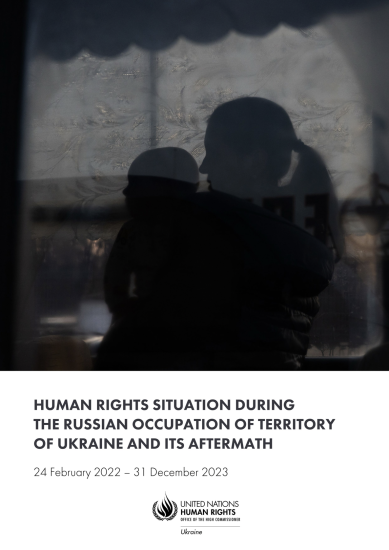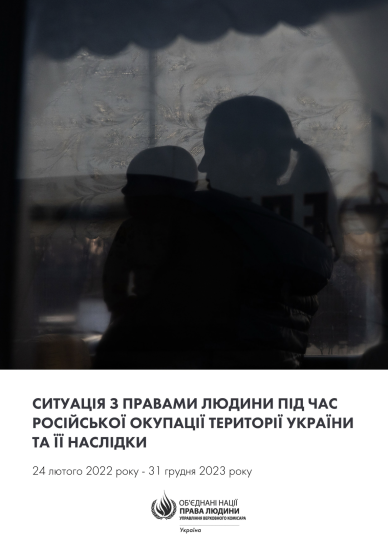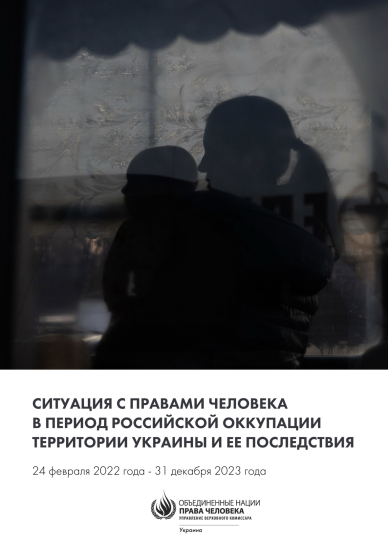Human rights situation during the Russian occupation of territory of Ukraine and its aftermath, 24 February 2022 to 31 December 2023

EXECUTIVE SUMMARY
-
This thematic report by the Office of the High Commissioner for Human Rights (OHCHR) describes the human rights situation in territory of Ukraine occupied by the Russian Federation following its full-scale armed attack, including areas over which Ukraine regained control afterward. It covers the period from 24 February 2022 to 31 December 2023 and is based on the work of the United Nations Human Rights Monitoring Mission in Ukraine (HRMMU). The Government of Ukraine continued to provide OHCHR with full access to territory under its control, including unfettered and confidential access to conflict-related detainees. The Russian Federation did not provide OHCHR with access to the territory of Ukraine which it occupies, or to conflict- related detainees it holds.
-
The report describes persistent patterns of violations of international human rights law (IHRL) and international humanitarian law (IHL) by the Russian Federation in occupied territory. The focus is on territory of Ukraine that fell under Russian occupation following the full-scale armed attack launched by the Russian Federation on 24 February 2022 – specifically areas of Donetsk, Kharkiv, Kherson, Luhansk, Mykolaiv and Zaporizhzhia regions. The report finds a systematic dismantling of fundamental rights and freedoms; cross-sector measures to stifle dissent; the subversion of Ukrainian systems of governance, administration, justice and education; the imposition of Russian systems and legal frameworks; and the suppression of expressions of Ukrainian culture and identity, affecting every aspect of daily life for residents. The report then describes the human rights consequences of occupation in areas of Kharkiv, Kherson and Mykolaiv regions over which Ukraine regained control in late 2022, as well as the impact of prosecutions for “collaboration activities” by Ukraine.
-
During the first months of occupation of Ukrainian territory in 2022, Russian armed forces carried out widespread arbitrary detention of civilians, often accompanied by torture and ill-treatment. Many cases also amounted to enforced disappearances. While Russian armed forces initially targeted individuals perceived as posing a security threat, over time a wider net was cast to include any person perceived to oppose the occupation. Individual Russian servicemen also perpetrated killings of civilians, especially in the first months. Russian armed forces used force to quash peaceful protests, restrict free expression, impose strict controls over residents’ movements, and pillage homes and businesses. Russian occupying authorities carried out surveillance and intensive searches, and restricted access to independent information. Russian armed forces and occupying authorities carried out these violations in an atmosphere of pervasive impunity. The result was a stifling climate of fear, which was used to solidify control over the residents, suppress dissent and opposition, and induce compliance.
-
Russian authorities instituted fundamental changes to the society and its governance, in direct violation of IHL provisions that require the occupying Power to minimize changes to the status quo ante. They used intimidation
and violence to coerce members of key public sector professions to cooperate with Russian occupying authorities. They applied laws and administrative systems of the Russian Federation to all spheres of life. They organized ‘local elections’, imposed the legal and judicial system of the Russian Federation, and required residents to comply with Russian business and property regulations. Those who resisted risked detention, violence and other reprisals. Residents without a passport of the Russian Federation were singled out by the occupying authorities, experienced harsher restrictions on their freedom of movement, and were progressively denied employment in the public sector, as well as access to healthcare and social security benefits.
-
In parallel, Russian occupying authorities implemented a policy of imposing their version of Russian identity, while supressing expressions of Ukrainian identity. They required teachers to follow the Russian curriculum, use the Russian language and teach history in a manner justifying the invasion of Ukraine. They shut down online classes conducted per the Ukrainian curriculum, seized Ukrainian books and art, and removed symbols of Ukrainian cultural heritage from public spaces. They enlisted children in Russian youth groups with the aim of teaching them Russian patriotism, contrary to the prohibition under IHL for the occupying Power to enlist children in formations or organizations subordinate to it. Meanwhile, Russian armed forces targeted individuals openly expressing their Ukrainian identity with detention and violence.
-
Ukraine recaptured substantial areas of occupied territory in late 2022, including Mykolaiv region and parts of Kharkiv and Kherson regions. OHCHR has access to these areas. The invasion, occupation and subsequent recapture by Ukraine of these areas left behind damaged homes and infrastructure, land contaminated by mines and explosive remnants of war (ERW), pillaged resources, a collapsed local economy and a traumatized, mistrustful community. The Government of Ukraine faced the challenge both to rebuild infrastructure and re-establish services, and to contend with IHL and human rights violations that occurred under occupation, including through war crimes investigations. It has also prosecuted residents under charges of collaborationism for their interaction or cooperation with Russian occupying authorities. These prosecutions, however, are based on an overly broad and imprecise provision which was introduced in the Criminal Code of Ukraine in March 2022, potentially criminalizing virtually all employment or business activities in occupied territory. It risks criminalizing conduct which individuals are compelled by the occupying Power to carry out in accordance with the law of occupation under IHL and which might be essential for or benefit the normal life of the population of the occupied territory. These prosecutions have led to instances of double victimization – persons who suffered human rights violations first under the Russian occupation are then being prosecuted for collaboration in a manner that violates their rights. In the course of identifying and prosecuting alleged collaborators, Ukrainian law enforcement officials have also perpetrated arbitrary detention, enforced disappearance, torture or ill-treatment, and violations to fair trial rights. Widespread prosecutions of this nature impede efforts to reintegrate people who lived in formerly occupied territory.
-
OHCHR remains committed to facilitating accountability for IHL and IHRL violations. The immediate overall imperative is that the Russian Federation ceases the use of force against Ukraine and “completely and unconditionally withdraw[s] all of its military forces from the territory of Ukraine within its internationally recognized borders” as per United Nations General Assembly Resolutions ES-11/1 and ES-11/4 (2022). Until this occurs, it is crucial that the Russian Federation ceases the widespread violations of IHL and IHRL perpetrated under occupation as documented in this report. By shedding light on the plight of civilians living under occupation, this report also aims to support a national dialogue on a comprehensive approach to accountability that includes both criminal accountability and wider measures promoting the victims’ rights to truth, justice and reparation.
-
This report is prepared pursuant to United Nations Human Rights Council Resolution A/HRC/RES/53/30 on cooperation with and assistance to Ukraine in the field of human rights, adopted on 14 July 2023. The report was also prepared pursuant to United Nations General Assembly Resolution 68/262 on the territorial integrity of Ukraine, which welcomed efforts of the United Nations to assist Ukraine in protecting the rights of all persons in Ukraine.
-
HRMMU acts within the framework of the Agreement between OHCHR and the Government of Ukraine, signed on 31 July 2014, and extended periodically since. In accordance with Article IV of the Agreement, HRMMU “monitors the human rights situation in the country and submits regular, accurate and public reports to the High Commissioner on the human rights situation, and problems and risks that arise”.



